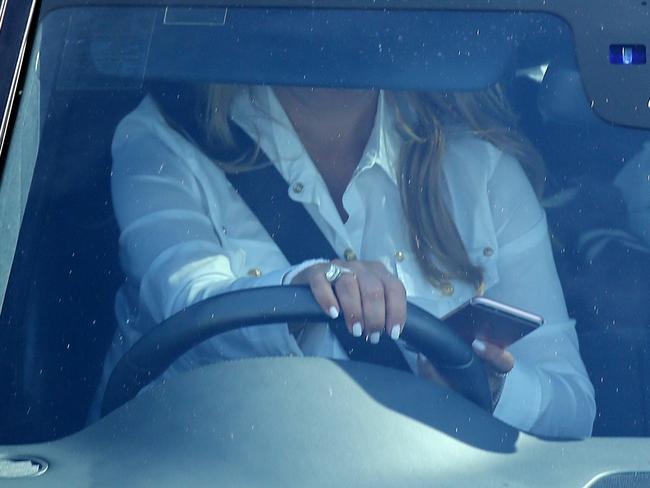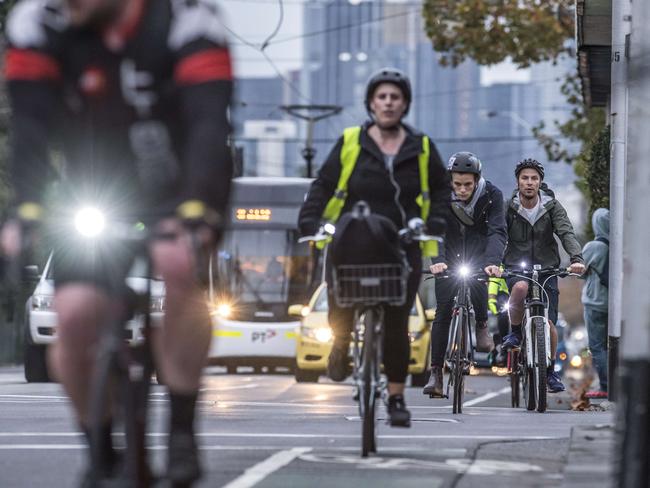Cycling lobby pushing for technology to limit mobile phone use in cars
CYCLISTS fed up with drivers who text behind the wheel are backing a new technology that could take their phones away from them completely.
IF YOU think nobody sees you when you pick up your mobile phone for a quick text while you’re driving, you’re wrong. Cyclists see you. And they’ve had enough.
Victoria’s cycling lobby wants to see the behaviour change — and they have a bold idea about how to change it.
The Bicycle Network is calling for devices to be made mandatory in all vehicles that block the use of mobile phones.
“As bike riders we can see into cars and what drivers are up to,” the network chief executive officer, Craig Richards, said in a statement on Wednesday.
“Every day we despair when we see drivers texting or just mucking around on Facebook. We understand the addictive lure of the phone but it’s risking people’s lives.
“It’s clear that current policing isn’t curbing behaviour. It’s unfair to put the burden on the police. We need to take phone use out of the hands of drivers.”
The technology renders phones useless by cutting the reception, but it is not without its flaws because it also blocks the signals to the phones of passengers.

The push comes after the release of a report by the Bureau of Infrastructure, Transport and Regional Economics that predicts Victoria’s road toll will spike by 2030, largely due to use of mobile phones behind the wheel.
The report states that while the road toll in general will be “slowly declining” thanks in large part to new vehicle safety technology, there are expected to be “rising deaths as a result of mobile phone use”.
The Bicycle Network says that while the number of motorists who die behind the wheel each year is declining, cyclist fatalities “have remained at 37 per year”.
The Herald Sun, which first reported the proposal today, wrote that blocking phone service was the “best way to protect cyclists”.
“Drivers have had plenty of time to show they have the self-discipline not to use mobile phones at the wheel, endangering their life, passengers’ lives, cyclists and pedestrians,” columnist Wendy Tuohy wrote.
“They have comprehensively shown they do not have the strength to resist picking up the phone; many don’t just pick it up when they are called either, they choose to go online while driving.
“They say one thing, ‘Oh no, I’d never be so stupid’, but Victoria Police evidence shows they do another.”
The proposal, however, looks like it won’t get off the ground. Premier Daniel Andrews said it would be too risky in emergency situations when motorists need fast access to their mobile network.

“We have no plans to introduce changes like that,” he told reporters. “That would seem to me a very big step and one that would have a whole range of technical challenges — you know how would you cut out emergency service vehicles for instance, in that sort of a comms ban?”
The idea is not a new one. It has been floated for several years and car manufacturers are not entirely against it.
Nissan developed technology last year that blocked phone signals when a device was placed in a compartment. The prototype dubbed Signal Shield could be built into the arm rest of a car. It would block all mobile, bluetooth and Wi-Fi signals, according to the UK’s Telegraph.
On social media, the idea received a mixed response. A number of people were against the idea.
“Ridiculous. What about passengers?” Sian Morton wrote.
“I listen to podcasts while I drive and have bluetooth for calls with controls (legally) on the steering wheel,” Lyn wrote. “Why don’t cyclists concentrate on obeying the road rules — or better yet — getting off the roads.”
But others said it was needed.
“Absolutely it’s time that technology was used to improve safety,” Pamela Harnden wrote. “People have proven and demonstrated time and time again that they cannot be trusted and are completely irresponsible.”




